新冀教版英语七年级下册Unit7 Lesson41 教案
册Unit7WorkforPeaceLesson41Jenny’sGoodAdvice教学设计(新版)冀教版
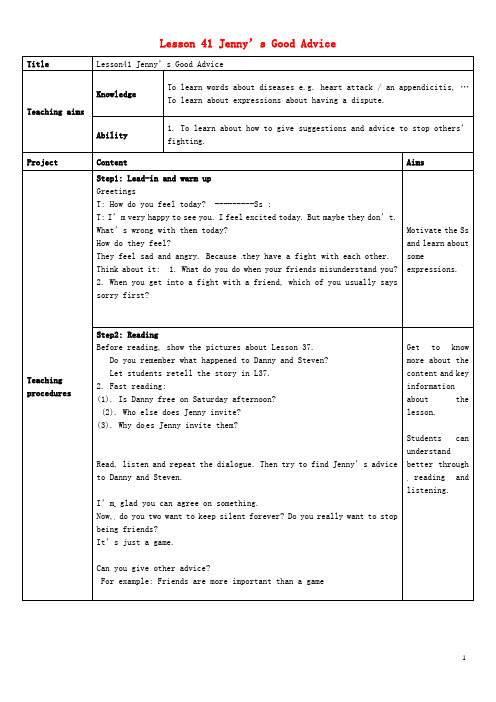
Lesson 41 Jenny’s Good Advice Title Lesson41 Jenny’s Good AdviceTeaching aims KnowledgeTo learn words about diseases e.g. heart attack / an appendicitis, …To learn about expressions about having a dispute.Ability1. To learn about how to give suggestions and advice to stop others’fighting.Project Content AimsTeaching procedures Step1: Lead-in and warm upGreetingsT: How do you feel today? ---------Ss :T: I’m very happy to see you. I feel excited today. But maybe they don’t.What’s wrong with them today?How do they feel?They feel sad and angry. Because they have a fight with each other.Think about it: 1. What do you do when your friends misunderstand you?2. When you get into a fight with a friend, which of you usually sayssorry first?Motivate the Ssand learn aboutsomeexpressions.Step2: ReadingBefore reading, show the pictures about Lesson 37.Do you remember what happened to Danny and Steven?Let students retell the story in L37.2. Fast reading:(1). Is Danny free on Saturday afternoon?(2). Who else does Jenny invite?(3). Why do es Jenny invite them?Read, listen and repeat the dialogue. Then try to find Jenny’s adviceto Danny and Steven.I’m glad you can agree on something.Now, do you two want to keep silent forever? Do you really want to stopbeing friends?It’s just a game.Can you give other advice?For example: Friends are more important than a gameGet to knowmore about thecontent and keyinformationabout thelesson.Students canunderstandbetter throughreading andlistening.Step3: PracticeHave a memory test about the text! Deal with the exercises and test the students’mastery about the knowledge and make students understand the text better..2. Work in groups. Pretend there is a dispute between two friends. Can yo u think of something to say to keep them from fighting?Dispute: Ben and Tim planned to go to the movie theatre together this Saturday. Tim arrived at the theatre on time, but Ben did n’t show up the whole e vening. Ben thought their plan was for Sunday. Now, Tim is upset and he hasn’t spoken to Ben for a week.Your advice:Step 4 Process: A Role Play Summarizethe expressions about how to give suggestions.Danny and Steven didn’t talk to each other for a few days. That Saturday, they both went to Jenny’s house, but they all ____________ at first. Jenny encouraged them to talk about the problem. Steven complained tha t Danny shouldn’t change the time they ____________. Danny explained the situation. He felt sorry that Steven missed the game. Steven said sorry to Danny because his basketball hit Danny on the head. But he didn’t ____________ do it. It was an accident. Th e two boys became friends again. ____________, friends are more important than a game.1. Work in groups: In your life, you have to have disputes with others. There are some situations you’ll perhaps meet, each group choose one topic to make a short play:Topic1: a dispute between a student and a teacherTopic2: a dispute between friends.Topic3: a d ispute between a mother and a child.Topic4: a dispute between a customer and an assistant Topic5: a dispute between you and a strangerTime for Show!Choose the best group.Choose the best actor and actress. . Practice speaking and dealing with kinds of disputes and giving other advice..Home- work Have you argued with others before? Or was there a dispute between yourfriends? How did you deal with the disputes between you and your friends,please write a story about that.Practicewriting. Payattention tothe tense,grammar andstructures.Board Design Lesson 41 Jenny’s Good AdviceTeamwork: expressions How to give advice to others Group1: mean to 1.Do you really want to stop Group2: keep silent being friends?Group3: agree on 2. It’s only a game….. Group4: after all 3. friends are more important Group5: than….。
七年级英语下册 Lesson 41教案 冀教版
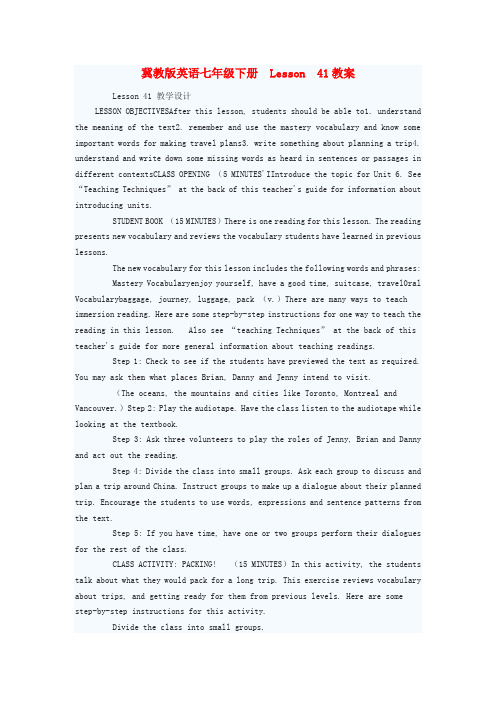
冀教版英语七年级下册Lesson 41教案Lesson 41 教学设计LESSON OBJECTIVESAfter this lesson, students should be able to1. understand the meaning of the text2. remember and use the mastery vocabulary and know some important words for making travel plans3. write something about planning a trip4. understand and write down some missing words as heard in sentences or passages in different contextsCLASS OPENING (5 MINUTES'IIntroduce the topic for Unit 6. See “Teaching Techniques” at the back of this teacher's guide for informatio n about introducing units.STUDENT BOOK (15 MINUTES)There is one reading for this lesson. The reading presents new vocabulary and reviews the vocabulary students have learned in previous lessons.The new vocabulary for this lesson includes the following words and phrases:Mastery Vocabularyenjoy yourself, have a good time, suitcase, travel0ral Vocabularybaggage, journey, luggage, pack (v.)There are many ways to teach immersion reading. Here are some step-by-step instructions for one way to teach the reading in this lesson. Also see “teaching Techniques” at the back of this teacher's guide for more general information about teaching readings.Step 1: Check to see if the students have previewed the text as required. You may ask them what places Brian, Danny and Jenny intend to visit.(The oceans, the mountains and cities like Toronto, Montreal and Vancouver.)Step 2: Play the audiotape. Have the class listen to the audiotape while looking at the textbook.Step 3: Ask three volunteers to play the roles of Jenny, Brian and Danny and act out the reading.Step 4: Divide the class into small groups. Ask each group to discuss and plan a trip around China. Instruct groups to make up a dialogue about their planned trip. Encourage the students to use words, expressions and sentence patterns from the text.Step 5: If you have time, have one or two groups perform their dialogues for the rest of the class.CLASS ACTIVITY: PACKING! (15 MINUTES)In this activity, the students talk about what they would pack for a long trip. This exercise reviews vocabulary about trips, and getting ready for them from previous levels. Here are some step-by-step instructions for this activity.Divide the class into small groups.Each group discusses what one person should take on a long trip. They must pretend that they only have one suitcase. Draw a box on the blackboard to show how big the suitcase is (You can make it any size you want. A bigger suitcase may make students work hard to “fill” it. A smaller suitcase will prov oke discussion about what a person really needs to take. )Each group makes a list of things to take and writes it down.With another group, each group talks about its list. The groups may question each other about their decisions. Did they forget anything important? They may add those items to their lists.If you have time, generate a list on the blackboard with suggestions from each group, one by one, until no one has any more suggestions. Will it all fit in the suitcase? If there is too much, ask the students to help you choose items to cross off.ACTIVITY BOOK (5 MINUTES)Play the audiotape. The aural exercises for this lesson are:1. Listen to the audiotape. Fill in the blanks. Write the words you hear.Jim and the DogJim was walking along the street. He saw a big dog. The dog saw Jim. Jim stopped walking.A woman was standing near the dog. “Excuse me,” Jim said. “Does your dog bite?”“No,” the woman said, “my dog doesn't bite.”Jim walked on. Then, the dog jumped up and bit him.“Hey!” Jim said to the woman. “You said your dog doesn't bite!”“It doesn't,” the woman said. “That's not my dog.”CLASS CLOSING (5 MINUTES)Below is the suggested homework for this lesson. Aim to give students about thirty minutes of homework. Use your discretion in deciding how much reading or how many exercises to assign as homework. Base your decision on students' progress.the first reading in the readerthe remaining activity book exercisesthe next lesson in the student book。
【最新】冀教版七年级英语下册Unit7 Lesson 41优质课课件.ppt

答案:A
(2013·甘肃白银·56)Daisy is such a good daughter that she ____ most of her spare time with her parents.
A.spends D.affords
B.costs C.takes
点拨:考查动词的辨析。spend, cost,take都 表示“花费”,只有spend的主语为“人”,
THE END 17、一个人如果不到最高峰,他就没有片刻的安宁,他也就不会感到生命的恬静和光荣。2020/12/162020/12/162020/12/162020/12/16
谢谢观看
spend, take, cost与pay spend表示花费时间、金钱,主语是人,常用句型: spend… on sth.和spend… (in) doing sth.。 My father spent five hours arriving home.我
爸爸花了 五个小时到家。 take表示花费时间,常构成句型:It takes/took sb.some time to do sth.。 It takes me half an hour to get to school.我
花半个小 时到校。 cost表示花费时间或金钱。主语是物。 The book cost me five yuan.这本书花了我五元
钱。 pay指买某物付给多少钱,句子的主语是人。
Quiz
There are many ___ish B.fishe C.fishing D.fishs
【拓展】 fish还可作可数名词,表示“鱼;鱼的种类”;
作不可数名词,表示“鱼肉”。
They spent a lot of time outdoors.他们花很多时间在户外。
冀教版七年级英语下册Lesson41WerePeopleHealthyThen教学设计

(一)教学重难点
1.重点:本节课的重点在于让学生掌握一般过去时的用法,以及频率副词在句子中的应用。同时,需要学生能够运用所学知识描述过去的事物和现象,如人们的健康状况、生活环境等。
2.难点:一是让学生在实际语境中灵活运用一般过去时和频率副词;二是培养学生通过听力、阅读等途径获取文本信息,并进行有效加工和处理的能力。
具体教学设想如下:
Step 1:导入(5分钟)
利用图片、视频等资源,展示过去与现在的环境、生活等方面的对比,引导学生关注本节课的话题。
Step 2:新知识学习(10分钟)
1.引导学生观察教材中的图片,预测课文内容。
2.学生自主阅读课文,理解大意,并完成相关练习。
3.讲解一般过去时的用法和频率副词的应用。
1.学生自主阅读课文,理解大意,并完成相关练习。
2.教师针对课文内容进行讲解,重点讲解一般过去时的用法和频率副词的应用,如:“At that time, people didn't have cars. They usually walked or rode bikes to work.”
3.教师设计一些实例,让学生观察、分析,进一步理解一般过去时和频率副词的用法。
4.重视课堂互动,鼓励学生提问、发表观点,充分调动他们的学习积极性,培养其思维品质和批判性思维。
5.在教学过程中,适时进行反馈与评价,关注学生的学习进度和问题,及时调整教学策略,以提高教学效果。
6.课后布置相关作业,巩固所学知识,并进行拓展延伸,如让学生采访家人或朋友,了解他们过去的生活,然后进行分享,提高学生的跨文化意识。
3.培养乐观向上的心态,学会珍惜现在的生活,感恩身边的人和事。
4.增强团队合作意识,学会与人沟通、交流,培养良好的人际关系。
冀教版英语七年级下册Lesson 41 教案
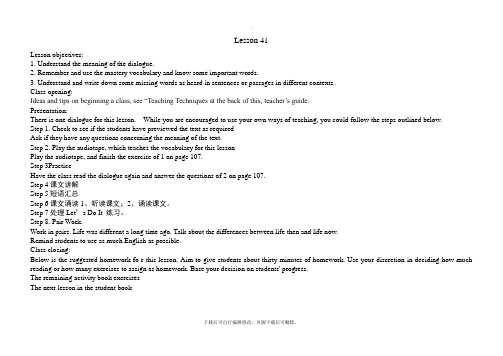
.Lesson 41Lesson objectives:1. Understand the meaning of the dialogue.2. Remember and use the mastery vocabulary and know some important words.3. Understand and write down some missing words as heard in sentences or passages in different contexts.Class opening:Ideas and tips on beginning a class, see “Teaching Techniques at the back of this, teacher’s guide.Presentation:There is one dialogue for this lesson. While you are encouraged to use your own ways of teaching, you could follow the steps outlined below.Step 1. Check to see if the students have previewed the text as requiredAsk if they have any questions concerning the meaning of the text.Step 2. Play the audiotape, which teaches the vocabulary for this lessonPlay the audiotape, and finish the exercise of 1 on page 107.Step 3PracticeHave the class read the dialogue again and answer the questions of 2 on page 107.Step 4课文讲解Step 5短语汇总Step 6课文诵读1、听读课文;2、诵读课文。
新冀教版七年级英语下册Unit7 Sports and Good HealthLesson41 精品课件

→ There were no supermarkets at that time. 2. Many different vegetables are in the salad. There are many different vegetables in →_____________________________________ the salad. _____ There is a letter at his front door. 3. A letter is at his front door. →_____________________________________ _____
________________ at that time
________________ make a Байду номын сангаасire ________________ 敲鼓 ________________ 猎取食物
2. 那时
3. 生火
4. play the drums
5. hunt for food
Ⅱ. 句型展示 1. 很久以前人们钓鱼吗? Did people go fishing ____ _____ _____? a _____ long time 2. 他们在户外花费大量的时间。
初中英语冀教版七年
级下
Unit7 Sports and Good Health
Lesson41: Were People Healthy
Then?
1
Warm-up Presentation Language Points
2
3 4
Exercise
Preview
Ⅰ. 短语互译
1. 钓鱼
【冀教版】七下英语Unit7SportsandGoodHealthLesson41__参考教案
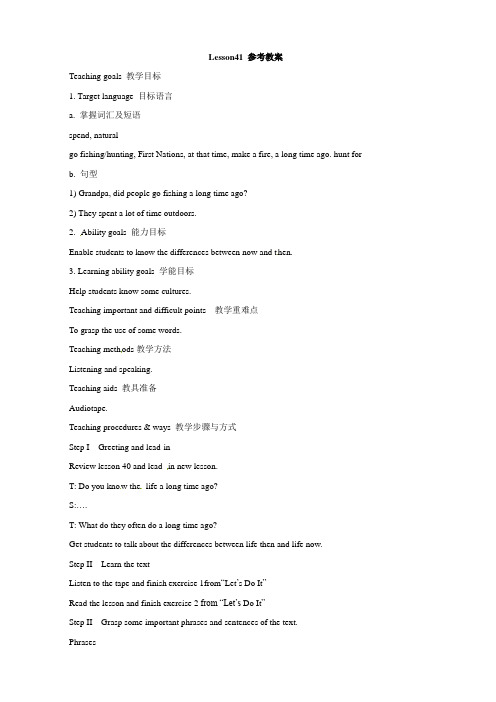
Lesson41 参考教案Teaching goals 教学目标1. Target language 目标语言a. 掌握词汇及短语spend, naturalgo fishing/hunting, First Nations, at that time, make a fire, a long time ago. hunt forb. 句型1) Grandpa, did people go fishing a long time ago?2) They spent a lot of time outdoors.2. Ability goals 能力目标Enable students to know the differences between now and t hen.3. Learning ability goals 学能目标Help students know some cultures.Teaching important and difficult points 教学重难点To grasp the use of some words.Teaching meth ods教学方法Listening and speaking.Teaching aids 教具准备Audiotape.Teaching procedures & ways 教学步骤与方式Step I Greeting and lead-inReview lesson 40 and lead in new lesson.T: Do you kno w the life a long time ago?S:….T: What do they often do a long time ago?Get students to talk about the differences between life then and life now.Step II Learn the textListen to the tape and finish exercise 1from“Let’s Do It”Read the lesson and finish exercise 2 from “Let’s Do It”Step II Grasp some important phrases and sentences of the text.Phrasesgo fi shing/hunting 去钓鱼/打猎at that time 在那个时候make a fire 生火a long time ago 很久以前hunt for 寻找Sentences1)Grandpa, did people go fishing a long time ago? 爷爷,在很久以前人们钓鱼吗?go fishing 意为“去钓鱼”,其构成形式为go+doing常见的词组还有:go swimming 去游泳;go skiing 去滑雪;go skating 去滑冰;go climbing mountain 去爬山2)At that time, there were no supermarkets. 那时候还没有超市。
2024年冀教版七年级英语下册教案Lesson41Were People Healthy Then?

Lesson 41 Were People Healthy Then?教学目标通过本课的学习,学生能够:1.熟练掌握《英语课程标准》要求的“四会”词汇及重要句型。
2.阅读文本,进一步了解第一民族(加拿大土著民族)健康的生活方式。
3.积极参与小组合作并发表关于健康生活方式的见解,在个人及合作学习的过程中体会到学习英语的乐趣及成就感。
4.培养良好的饮食习惯,关爱健康,服务社会。
语篇研读What: 本课语篇是一段对话,作者以对话的形式呈现出第一民族(加拿大土著民族)健康的生活方式,让学生进一步了解关于运动与健康的话题,并学会如何表达运动与健康。
同时让学生了解加拿大的民族文化。
Why: 作者以对话的形式呈现出第一民族(加拿大土著民族)健康的生活方式,启发学生对比第一民族(加拿大土著民族)与现代人的生活方式,从而对健康的生活方式有深入的认识,培养学生良好的饮食习惯和运动习惯,形成健康的生活方式,同时引导学生进行跨文化知识的学习。
How: 语篇采用对话的形式,以Dena提问,Mr. Morin解答的形式把第一民族(加拿大土著民族)的生活方式呈现出来,结构清晰。
教学过程设计理念:以《英语课程标准》核心素养为导向,以单元主题为引领,基于语篇的育人理念,体现《英语课程标准》“学思用创”的英语学习活动观和“教—学—评”一体化设计理念。
续表板书设计Lesson 41 Were People Healthy Then?First Nations people↙↘Food Activities作业设计基础型作业:Review and recite the important points of this lesson. 实践型作业:Ask the students to talk about their own life.教学反思。
冀教版七年级下册英语 Lesson 41 教案(教学设计)

Unit 7 Sports and Good Health Lesson 41 Were People Healthy Then?单词spend, natural, nation, hunt, pow-wow1.掌握There be结构和一般过去时的用法。
2.了解好的生活方式对人们健康的影响。
正确使用本课的词和短语,分辨、会用spend, natural, nation, hunt, pow-wow, go fishing/hunting, First Nations, at that time, make a fire。
Step 1.Lead inLeading in 【情景1】Show some pictures of summer to the students.Ask them to talk about the pictures.Point to the pictures.Ask the students questions:T:What are these people doing in the picture?S1:They are fishing.T:What are those people doing in the picture?S2:They are hunting.T:What are the women doing?S3:They are planting crops and vegetables.T:What are the people doing in the picture?S4:Some people are playing the drums and others are dancing around the fire.Leading in 【情景2】Work in groups.Ask the students to talk about how to stay healthy.S1:How do we have a healthy life?S2:We must eat healthy food,fruit and vegetables.S3:We must do some exercise.S4:We must study hard, but at the same time, we need to relax.S5:Do we need to go fishing and hunting?S6:No, we don’t.We didn’t live in the past.S7:We should wash the fruit and vegetables to make them clean before eating.S8:We shouldn’t eat snacks.After a few minutes, ask the groups to give a speech in front of the class.Group 1:To stay healthy, we must eat healthy food, fruit and vegetables.We must study hard, but at the same time, we need to relax.We should wash the fruit and vegetables to make them clean before eating.We shouldn’t eat snacks.Step 2.Presentation1.Show the students pictures or objects and learn the new words and expressions in this part:spend, natural, nation, hunt, pow-wow, go fishing/hunting, First Nations, at that time, make a fire.T:What do you do on weekends?S9:I spend much time reading.T:Now read after me “spend”.S:Spend.T:Is natural food good for us?S10:Of course.T:Now read after me “natural”.S:Natural.2.Ask the students to work in pairs.Try to make a conversation with the new words and phrases.T:Try to make conversations with the new words and phrases.S11:Do you like going fishing?S12:Yes,I do.Fishing is interesting.S11:Do you like hunting?S12:No.We can’t hunt in the forest.S11:Can we make a fire and dance around it?S12:Of course.When we go camping, we often do that.Step 3.Practice1.Retell the story.Ask the students to retell the text.Ask a few students to try in class.2.Work in pairs.Create a new dialogue about healthy lifestyle.Ask a few pairs to act them out in front of the class.S13:What do you often do after school?S14:I often play basketball with my friends.What about you?S13:I often read books at home.3.Make sentences with the new words, expressions and grammars.Step 4plete Let’s Do It!Exercise 1 is listening part.We have finished it in class.Exercise 2 is about reading test.We have finished it in class.Exercise 3 is about rewriting the sentences using the proper form of “there be” of the text.Check the answers in class.Step 5.TaskPair work:Let’s Do It! Exercise 4.Work in pairs.Life was different a long time ago.Talk about the differences.Example:A:Today we buy food at the supermarket.But there were no supermarkets a long time ago.Where did people get food?B:People went fishing and hunting for food.They always ate good, natural food.Now people eat a lot of fast food.Ask the students to discuss in groups.Create more dialogues.After a few minutes, ask some groups to act their dialogues out in front of the class.1.The boy wants to have a (health) body.2.Did people (eat) meat a long time ago?3.He spent much time (read) in the library.4.We (rest) at home last weekend.5.She (dance) with her friends at the party.答案:1.healthy 2.eat 3.reading 4.rested 5.danced1.Remember the words and phrases in this lesson.2.Read the text after class.3.Prepare for the next lesson.。
冀教版英语七年级下册Unit 7:Lesson 41 Were People Healthy The

七年级英语下册Lesson41:Were People Healthy Then?导学案【学习目标】1、掌握重点单词和短语:nation/hunt/spend/natural/ pow-wow.Go fishing/hunting/First Nations /at that time/make a fire.2、理解重点句型并仿写句子。
【学法指导】1、通过自学勾画出课文中的新单词、短语,并整理。
2、同桌间、小组内互相帮助,大胆质疑,巩固要点。
3、创设情境,编写对话。
【重点难点】1、理解文意,相互评价补充。
2、掌握重难点知识,并运用造句。
【自主预习】一.读课文,用红笔圈出文中的生词朗读几遍,并造句。
二.再读课文,用黑笔画出文中的短语。
1) 在湖边____________________ 2)很久以前_______________ 3)那时________________ 4)去钓鱼_________________5)去打猎___________ 6)生火_________________7)第一民族________________2、列举两个新短语,并造句。
【合作探究,智慧展示】1、听录音,巩固单词读音,并完成“Let’s Do It”第一题。
2、认真倾听同伴对课文的理解,并进行评价。
漂亮的句子:需要完善的句子:3、分析理解下面重点句,总结句子中所包含的重点短语和句型。
At that time, there were no supermarkets.Our people always went fishing and hunting for food.They spent a lot of time outdoors.We still have pow-wow dances today.【随堂训练,大展身手】与你的同伴对对话吧1. A∶What did you have for supper yesterday? B∶____________2. A∶_________B∶Tomatoes, of course. I think they are delicious.3. A∶________________B∶Three times a week.4. A∶When do you usually have fruit? B∶______________5. A∶Breakfast is important. We must have it every day.B∶_________A. How often do you write to your parents?B. I eat it after lunch and after supper.C. What vegetables do you like best?D.I’d like to have some apples and bananas.E. I had some porridge and eggs.F.What’s your favourite fruit?G. You are right. It’s good for us.【拓展延伸】中考链接1. She 150¥on the bike, but it me only 100¥in another shop.A spent; cost B. spend; costs C. cost; spent D. cost; spend2.Will you with me next week?A. go huntingB. went huntingC. going huntingD. go hunt3.There a book and two pens on the desk.A. isB. areC. be4.There many classes in our school.A. areB. isC. be。
初中冀教版英语七年级下册【教学设计】Unit 7 Lesson 41
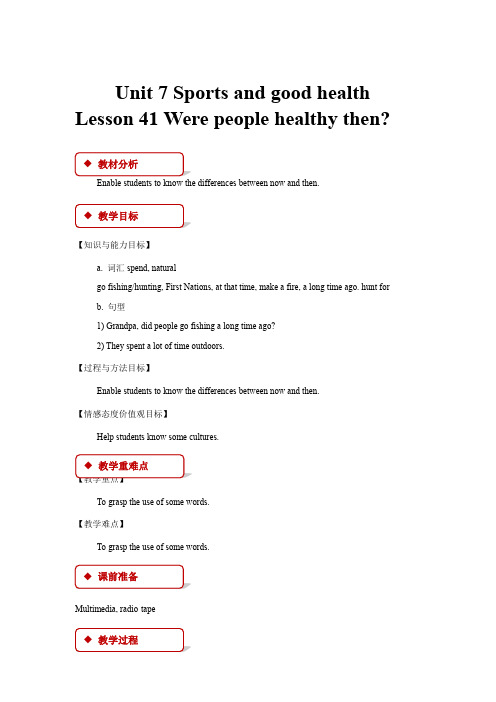
Unit 7 Sports and good healthLesson 41 Were people healthy then?Enable students to know the differences between now and then.【知识与能力目标】a. 词汇spend, naturalgo fishing/hunting, First Nations, at that time, make a fire, a long time ago. hunt for b. 句型1) Grandpa, did people go fishing a long time ago?2) They spent a lot of time outdoors.【过程与方法目标】Enable students to know the differences between now and then.【情感态度价值观目标】Help students know some cultures.To grasp the use of some words.【教学难点】To grasp the use of some words.Multimedia, radio-tapeStep I Greeting and lead-inReview lesson 40 and lead in new lesson.T: Do you know the life a long time ago?S:….T: What do they often do a long time ago?Get students to talk about the differences between life then and life now.Step II Learn the textListen to the tape and finish exercise 1from“Let’s Do It”Read the lesson and finish exercise 2 from “Let’s Do It”Step II Grasp some important phrases and sentences of the text.Phrasesgo fishing/hunting 去钓鱼/打猎at that time 在那个时候make a fire 生火a long time ago 很久以前hunt for 寻找Sentences1)Grandpa, did people go fishing a long time ago? 爷爷,在很久以前人们钓鱼吗?go fishing 意为“去钓鱼”,其构成形式为go+doing常见的词组还有:go swimming 去游泳;go skiing 去滑雪;go skating 去滑冰;go climbing mountain 去爬山2)At that time, there were no supermarkets. 那时候还没有超市。
冀教版七年级英语下册Lesson41WerePeopleHealthyThen优秀教学案例
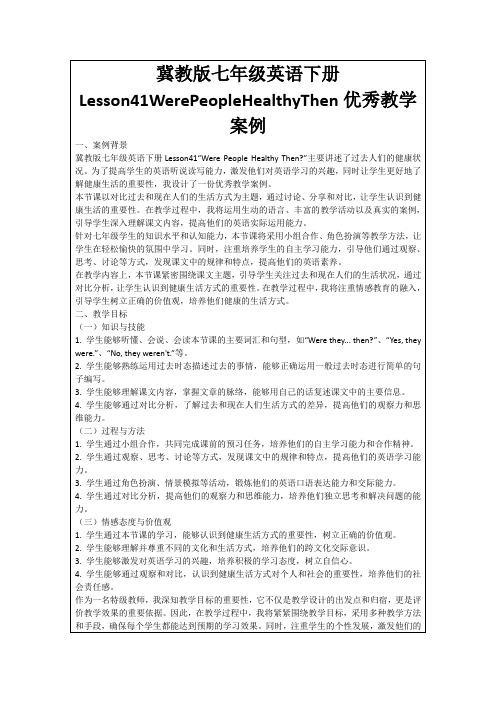
(二)讲授新知
1.在讲授新知识时,我会以生动的语言和丰富的教学活动,向学生介绍课文的主要内容。通过讲解课文中的关键句子和词汇,帮助学生理解和掌握课文的主题和要点。
2.结合课文内容,我会进行一些拓展和延伸,让学生了解过去人们的生活方式以及健康生活的重要性。通过举例和讲述相关的真实案例,让学生更深入地理解课文内容。
3.小组合作:将学生分成小组,进行合作学习。通过小组讨论、角色扮演等活动,让学生在合作中交流、分享和对比,提高他们的合作能力和团队意识。这种小组合作的学习方式还能够培养学生的自主学习能力和创新精神。
4.反思与评价:在课堂结束前,引导学生进行自我反思和评价,思考自己在本节课中学到了什么,有什么收获和感悟。通过学生自评、同伴评价和教师评价,对学生的学习效果进行评价。这种反思与评价的教学方法能够帮助学生巩固所学知识,培养他们的评价能力和自我反思能力。
2.通过总结归纳,帮助学生梳理和巩固所学知识,提高他们的归纳和表达能力。
3.引导学生思考和规划自己的健康生活方式,培养他们的自主学习能力和创新精神。
(五)作业小结
1.在课堂结束前,我会布置一些相关的作业,让学生进一步巩固所学知识。作业可以包括课后阅读、写作练习等,让学生在实践中运用所学知识。
2.同时,我会提醒学生课后及时复习和总结,巩固所学知识,为下一节课做好准备。
五、案例亮点
1.情景创设法:通过展示过去和现在人们生活方式的对比图片,引发学生对课文主题的思考,激发了学生的学习兴趣,增强了学生的直观感受。这种情景创设法不仅能够吸引学生的注意力,还能够帮助学生更好地理解和记忆课文内容。
2.问题导向:通过提出一系列问题,引导学生思考和探索过去人们的生活方式以及健康生活的重要性。这种问题导向的教学方法能够激发学生的思考兴趣,培养他们的思维能力和批判性思维能力。
【冀教版七年级英语下册】Unit7Lesson41WerePeopleHealthyThen教案
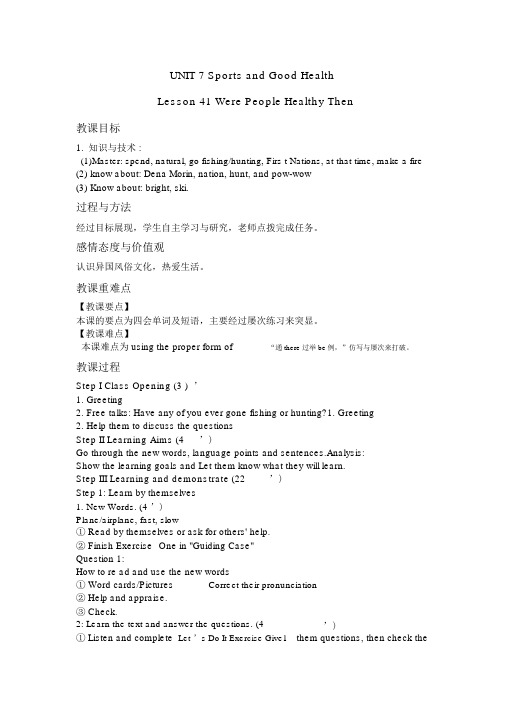
UNIT 7 Sports and Good HealthLesson 41 Were People Healthy Then教课目标1.知识与技术 :(1)Master: spend, natural, go fishing/hunting, Firs t Nations, at that time, make a fire(2)know about: Dena Morin, nation, hunt, and pow-wow(3)Know about: bright, ski.过程与方法经过目标展现,学生自主学习与研究,老师点拨完成任务。
感情态度与价值观认识异国风俗文化,热爱生活。
教课重难点【教课要点】本课的要点为四会单词及短语,主要经过屡次练习来突显。
【教课难点】本课难点为 using the proper form of“通there过举be例,”仿写与屡次来打破。
教课过程Step I Class Opening (3 )’1.Greeting2.Free talks: Have any of you ever gone fishing or hunting?1. Greeting2.Help them to discuss the questionsStep II Learning Aims (4’)Go through the new words, language points and sentences.Analysis:Show the learning goals and Let them know what they will learn.Step III Learning and demonstrate (22’)Step 1: Learn by themselves1.New Words. (4 ’)Plane/airplane, fast, slow① Read by themselves or ask for others' help.② Finish Exercise One in "Guiding Case"Question 1:How to re ad and use the new words① Word cards/Pictures Correct their pronunciation② Help and appraise.③ Check.2: Learn the text and answer the questions. (4’)① Listen and complete Let ’s Do It Exercise Give1them questions, then check theanswers②Read and complete Let ’s Do It Exercise 2Help and checkStep2: Discussion and team work (9’)1.Class Work: Let ’ s Do It! NoInstruct.3 students to rearrange the words and rewrite the sentences correctly.2.Look for the important language points I will give them some hints.3.Read and ShareWork in pairs: Complete Let’ s Do It!HelpNoand.4 praise.Step 3: Practise and demonstrate (5’)①Make sentences with the phrases or structures or important words help them to use different ways to show:Enjoy and praise, then correct their mistakes at the same time.IV Quiz and appraise (5-6’)1.Finish the exercises on the Power Point. (Discuss)2.Exercise 1 in Exercise Book. Show the exercises in time, then present.V Summary (3 ’ )Ask the Ss to summary themselves.Homework1.Based on the lesson, have the students write a few sentences about what would the best part of living long ago and what would be the worst part.2.Preview the next lesson教课反思。
冀教版七年级下册unit 7《lesson 41 were people healthy then》教学课件

2. They spent a lot of time outdoors. 他们花很多时间在户外。 spend 花费,主语必须为人,常用于结构: sb. spend … on sth. sb. spend…(in) doing sth. The man spends an hour on books every day. =The man spends an hour (in) reading books every day. 这个人每天花费1小时看书。
11
Practice
翻译下列句子,每空一词 1. 很久以前,人们吃什么?
What _d_i_d__ people eat a __lo_n_g__ __ti_m__e_ __a_g_o___? 2. 你每天花多长时间看电视?
How long do you _sp__en__d _w__a_tc_h_i_n_g__ TV every day? 3. 太冷了。我们生一堆火吧。
3. Were they healthy then? Yes, they were.
8
Read the lesson and complete the passage with the correct words.
First Nations People came to _C_a_n_a_d_a_ a long time ago. They went fishing and _h_u_n_t_in_g_ for food every day. They spent a lot of time outdoors and they ate good, n__a_tu_r_a_l food. After a hard day of work, they often made a big __fi_r_e_and had pow-wow dances. Some people played the drums and _o_th__er_s_ danced around the fire.
【教学设计】Unit 7 Lesson 41(冀教)1

Unit 7 Work for PeaceLesson 41 Jenny's Good Advice1. Analysis of the StudentsThe students of Grade 9 have mastered certain vocabularies,expressions and structures. They also have the abilities of self-teaching and working in groups. Most of them are willing to expres s their opinions in English.2. Analysis of Teaching Cont entLesson41 is the fifth lesson i n Unit 7, Book 5.This unit focus on the subject Work for peace, Students cares about the subject because it is close to everyone. Lesson 41 mainly talks about Danny and Steven fight again, Jenny’s advice for them. Deal with their misunderstanding.1.To master the words: silence, silent, elder, directly.2. To master the phrases: keep silent, agreed on, mean to, after all.【能力目标】Improve the students’ ability of speaking, listening, reading and writing. How to deal with the misunderstanding and fighting.【情感目标】To learn how to give suggestions and advice to stop fighting.【教学重点】To master the words and phrases.【教学难点】To know about how to deal with the misunderstanding.Tape recorder, MultimediaStep 1. Warm-up1.Enjoy a picture abo ut fighting, and elicit the phrase “get into a fight”.2.Free talk: (1) What do you do when your friends misunderstand you?(2)When you get into a fight with a friend, which of you usually says sorry first?Step 2. Presentation1.Show the pictures of Jenny’s advice and ask students: Who are they? What happened?2.Explain the new words.3.Listen to the dialogue and answer the questions.(1)Is Danny free on Saturday afternoon?(2)Who else does Jenny invite?(3)Why does Jenny invite them?4.Check the answers.5.Explain the language points:agree to do“应允,愿意”。
- 1、下载文档前请自行甄别文档内容的完整性,平台不提供额外的编辑、内容补充、找答案等附加服务。
- 2、"仅部分预览"的文档,不可在线预览部分如存在完整性等问题,可反馈申请退款(可完整预览的文档不适用该条件!)。
- 3、如文档侵犯您的权益,请联系客服反馈,我们会尽快为您处理(人工客服工作时间:9:00-18:30)。
Unit 7 Lesson 41 教案
Teaching Aims:
1.Master the new words: nation, hurt , spend, natural, pow-wow.
2.Some useful expressions:go fishing/hunting, First Nations, at that
time, make a fire
3.Know about people how to keep healthy at that time.
Key points: Did people go fishing a long time ago?
We are First Nations people.
At that time, there were no supermarkets.
In the evenings, they often made a big fire.
Difficult point:How to use “spend ”and how to keep healthy at that time.
Teaching Resources:recorder , multimedia
Teaching procedure:
Step1 Class Opening
1.Greetings
Good morning, class. How are you today?
Tell me, have any of you ever gone fishing? Has anyone ever gone hunting?
Have students give their examples.
2. Review some of the key importance from Lesson 40.
Step2 New Concepts
1. Leading in : T : Can you guess what this lesson is about?
S : It’s about a different time.
T : That’s right. Not long ago, most people did not live in cities. They lived on farm and had to work very hard just to have enough to eat. There were no computers to sit in front of. And certainly no donuts! Do you think it is easy living then.
S : Yes/No (discuss this with the class)
T : Today we will see people at that time how to keep healthy.
2. Listen .1) Play the tape for Lesson 41.
2) Play the tape a second time and all the students to complete Ex1.
3) Discuss the answers as a class . Make sure the students
understand the key words and phrases.
3. Read. 1) Instruct the students to read Lesson 41 to themselves , and
complete the passage independently.
2) Upon completion , students should check and correct their answers in groups.
3) Check the answer as a class.
4. Practice: class work.
1) Instruct students to rearrange the words and rewrite the sentences correctly.
2) Upon completion ,have students present their answers for one question to the class.
3) Review any problem words.
5. Language points.
Step 3: Let’sDo It. Do Ex4.
Work in pairs. Life was different a long time ago. Talk about the differences between life then and life now.
Step4: Class closing
Assign homework
Were People Healthy Then: Based on the lesson, have the students write a few sentences about what would be the best part of living long ago and what would be the worst part.。
